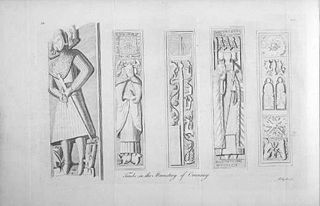Related Research Articles

George MacDonald was a Scottish author, poet and Christian Congregational minister. He became a pioneering figure in the field of modern fantasy literature and the mentor of fellow-writer Lewis Carroll. In addition to his fairy tales, MacDonald wrote several works of Christian theology, including several collections of sermons.

Kidnapped (1938) is an adventure film directed by Otto Preminger and Alfred L. Werker, starring Warner Baxter and Freddie Bartholomew, and based on the 1886 novel Kidnapped by Robert Louis Stevenson.

Gerald William Balfour, 2nd Earl of Balfour, PC, known as Gerald Balfour or The Rt Hon. G. W. Balfour until 1930, was a senior British Conservative politician who became a peer on the death of his brother, former prime minister Arthur Balfour, in 1930.
The Advertising Hall of Fame, operated by the American Advertising Federation (AAF), began in 1948 as a result of a proposal by the New York Ad Club and its president, Andrew Haire, to the Advertising Federation of America, the predecessor organization to the American Advertising Federation. The council of judges and its executive committee are appointed each year by the president of the American Advertising Federation and chair of the Advertising Hall of Fame. These distinguished industry executives are chosen from the ranks of advertisers, agencies, media organizations and academic institutions in the United States. The council of judges considers the election of either living or deceased persons whose record of advertising and service must be accomplished in the United States or with an American company abroad. To be eligible, individuals must be retired from their primary careers.

John of Islay was the Lord of the Isles (1336–1386) and chief of Clan Donald. In 1336, he styled himself Dominus Insularum, although this was not the first ever recorded instance of the title in use. Some modern historians nevertheless count John as the first of the later medieval Lords of the Isles, although this rather broad Latin style corresponds roughly with the older Gaelic title Rí Innse Gall, in use since the Viking Age. For instance, the even more similar Latin title dominus de Inchegal, applied to Raghnall Mac Somhairle in the mid-12th century. In fact John is actually styled Rí Innsi Gall or King of the Isles shortly after his death in a contemporary entry in the Irish Annals of Ulster. Clan Donald considers the title "Lord of the Isles" to have been in use at least since Angus Mor Macdonald, who died in 1293. and the title "King of the Isles" in use since Somerled, the Norse-Gael who forged the Kingdom of the Isles in the 12th century.
Thomas H. MacDonald was a British stage and film actor.
The Board of Control of Toronto, Ontario, Canada, was a part of its municipal government until it was abolished in 1969. It served as the executive committee of the Toronto City Council. When it was initially created in 1896 by mandate of the provincial government, it consisted of three Controllers appointed from and by the aldermen, and presided over by the Mayor of Toronto. Beginning in 1904, the Board of Control was directly elected by the city's electorate and consisted of four Controllers, presided over by the Mayor. Each voter could vote for up to four candidates, and the four with the most votes were elected. By tradition the controller who received the most votes would get the powerful budget chief position.
Municipal elections were held in Toronto, Ontario, Canada, on January 1, 1941. Frederick J. Conboy was elected mayor.
The 1973 Argentina rugby union tour of Scotland and Ireland was a series of eight matches played by the Argentina national rugby union team in Scotland and Ireland in October and November 1973. The Pumas won only of two of their matches, lost four and drew the others; they lost both of their international matches, against Ireland and Scotland. Neither Ireland nor Scotland regarded the matches as full internationals and did not award caps for the games.

Eve Balfour was a New Zealand-born British stage and film actress.
Burnt Wings is a 1916 British silent drama film directed by Walter West and starring Eve Balfour, Joseph Tozer and Thomas H. MacDonald. It was adapted from the 1909 novel Burnt Wings by Mrs Stanley Wrench. A woman decides to bring up a baby that her husband has had with his mistress.
Love and Hate is a 1924 British silent comedy film directed by Thomas Bentley and starring George Foley, Eve Chambers and Frank Perfitt. It was made by British & Colonial Kinematograph Company at the company's Walthamstow Studios.
The Odds Against Her is a 1919 British silent drama film directed by Alexander Butler and starring Milton Rosmer, Edna Dormeuil and Lorna Della. It was made at Ealing Studios.
The Woman of the Iron Bracelets is a 1920 British silent crime film directed by Sidney Morgan and starring Eve Balfour, George Keene and Marguerite Blanche.
Jack Tar is a 1915 British silent war film directed by Bert Haldane and starring Jack Tessier, Eve Balfour and Thomas H. MacDonald. An Admiral's daughter goes undercover in Turkey to help a British agent thwart a German plot during the First World War.
Five Nights is a 1915 British silent romance film directed by Bert Haldane and starring Eve Balfour, Thomas H. MacDonald and Sybil de Bray. It was based on a novel of the same title by Victoria Cross.

The National Council of Women exists to co-ordinate the voluntary efforts of women across Great Britain. Founded as the National Union of Women Workers, it said that it would "promote sympathy of thought and purpose among the women of Great Britain and Ireland".
Wee MacGregor's Sweetheart is a 1922 British silent romance film directed by George Pearson and starring Betty Balfour, Donald Macardle and Nora Swinburne.